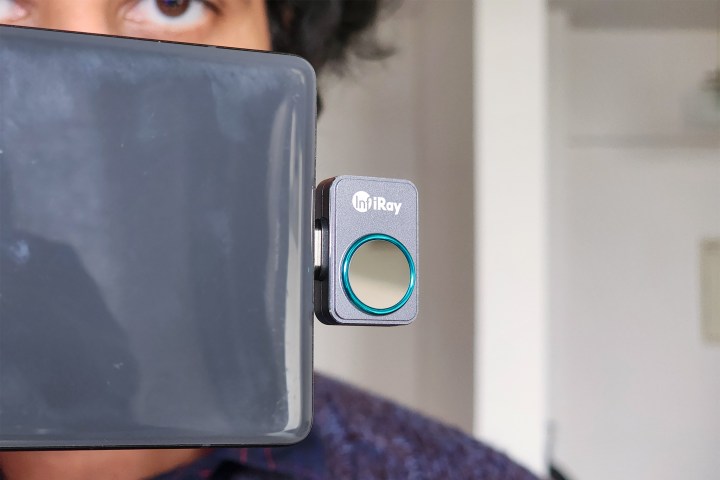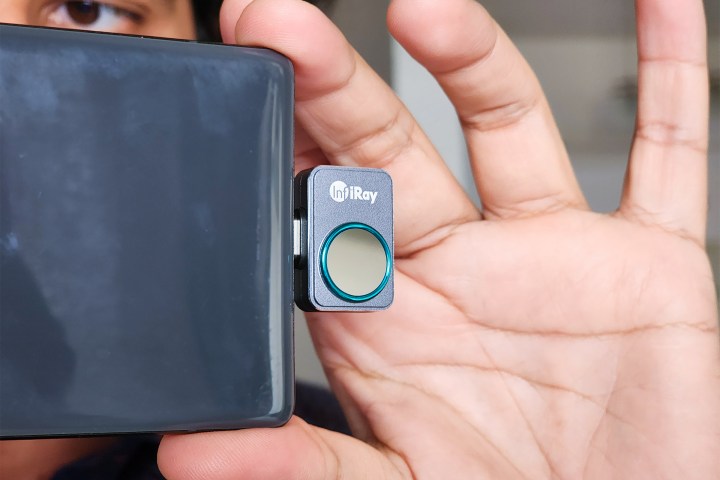
I am a chinophile. Before you set out to Google the word, it means that I love winters (and obviously prefer them over summers). More time to stay in bed, more reasons to have soup and hot chocolate without guilt, and no need to look for excuses for putting on some weight are among my top reasons. I also happen to be someone who loves sunsets way more than sunrises — that makes me an opacarophile.
One evening, while walking my dog and looking at the sunset, I wondered at how small changes in the sun’s position (relative to its distance from the Earth) make considerable changes to our weather. The thought soon evolved into a thought about how our blue planet’s position in the solar system is pivotal for life on Earth. A rift of a few hundred thousand miles in the Earth’s position would have meant that humans would never lament over the threats of artificial general intelligence (AGI). That’s how central heat is to our existence. As I write this, I also wonder if perhaps the same thought a decade ago could make thermodynamics feel less debilitating during college for me.
That’s why I set out to explore some ways heat impacts us but goes unnoticed in our daily lives. For my pursuit, I’m using a tiny thermal camera that attaches to any phone or tablet through the USB port and opens up a new dimension of how dynamic heat is around it — even though we only notice it when it’s too hot or cold.
What this tiny thermal camera offers

This camera is made by InfiRay, a company specializing in thermal imaging equipment of varying sizes for a wide range of personal and enterprise applications. Its product line spans monoculars, rifle scopes, handheld scanners, CCTVs with thermal imaging, and infrared cameras for level-1 self-driving vehicles. Compact thermal cameras that can be hooked up to smartphones or tablets comprise another category that InfiRay caters to, and the P2Pro — the model I have — is the smallest and lightest thermal camera it has made so far.
In fact, InfiRay claims this to be the smallest detachable thermal camera accessory in the world. Per the official specs sheet, the camera weighs only 9 grams or 0.32 ounces. Although my scale tells me it weighs 11g, I wouldn’t notice the difference. The camera I use connects via a USB-C port and is specifically made to work with any Android phone or tablet, while another variant with a Lightning port is also available for iPhones.
The hardware inside the sensor has a meager resolution of 256 x 192 pixels (about 0.05 megapixels), but that’s enough to paint an iridescent picture. The ASIC chip that drives the camera is made in-house to ensure the best utilization of processing power. It translates to minimum lag while capturing photos or videos and instantly updating the colorful gradients and temperatures at different points.
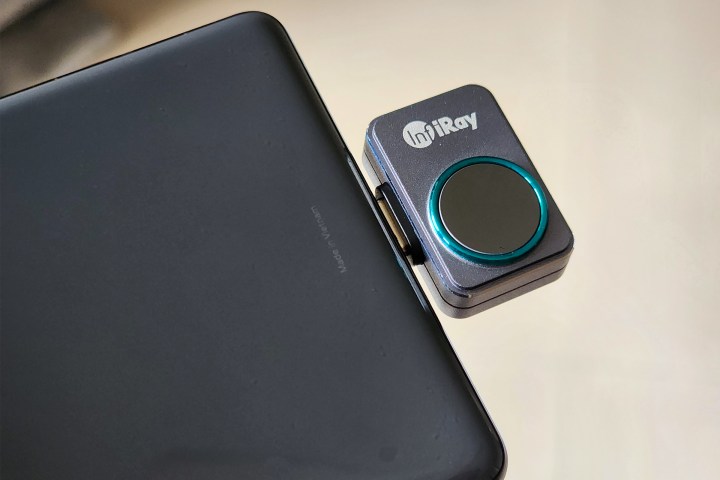
The camera officially supports temperatures between -20 to 650 degrees Celsius (-4 to 1,200 degrees Fahrenheit), making it reasonably useful across numerous applications inside and outside your home. The temperatures at different points on the frame are shown and actively updated on the screen for added utility. In addition, several color modes offer additional visibility based on the scenario.
Lastly, the camera has a shutter cover for when you’re not using it and an optional macro filter that allows you to focus on objects as close as 2.4 centimeters (roughly an inch). The box also contains a tiny pouch to carry the camera and its additional accessories, along with a USB-C extension cable if you want to move the thermal camera around.
InfiRay suggests a range of utilities for the thermal camera, from inspecting fine capacitors on circuit boards to inspecting parts of your car’s engine for any malfunction. However, with heat playing such an integral part in our lives, I want to look at some of the fun uses of the camera.
Cooking at the right temperature

Anyone who has spent a sizeable amount of time standing in front of the kitchen stove will vouch for the importance of optimal heat. This makes thermometers essential among our cookware. But it’s not always possible to thrust a glass stick into our food, especially when dealing with high heat. For outdoor grilling or baking activities, cooking at the right temperature can be the key to great taste. And that is what makes thermal cameras like the P2Pro fun for recreational activities, not just work or inspection as the company suggests.
For me, it comes in handy while consuming the world’s most popular drug — coffee. A notion imbibed deep in my psyche is that chugging a gut-twisting concoction of dark roast chicory-coffee blend and water is crucial in building a writer’s character. So, for the last decade, I have spent fending off writer’s block, starting my day with coffee. Over time, I have learned to figure out the blends I like and understood that temperature plays an undisputed role in brewing coffee.
I prefer brewing my coffee manually using a French press (because I like the process better than my cheap coffee maker and can’t afford a fancy barista machine yet). I bring the water to a boil and then let it sit for a few seconds before pouring it over the grounds — because boiling water can burn the coffee and leave a bitter taste. If you don’t like coffee, you might see this as maniacal behavior, but let me justify it by saying that we all have our coping mechanisms. With this InfiRay camera, I have been carefully (or rather, obsessively) watching the water’s temperature between 92 to 96 degrees Celsius (197 to 205 degrees Fahrenheit) and ensuring I use all the scientific guidance to extract the perfect taste.
Besides brewing coffee at the perfect temperature, I also use the camera to ensure it has cooled down enough for me to relish the taste without burning my mouth.
Inspecting your surroundings
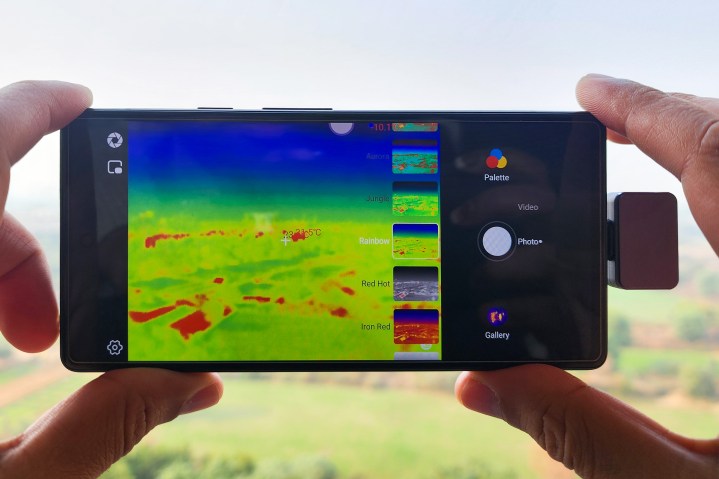
Thermal cameras can be an excellent means to survey the environment and even prove to be life-saving for outdoor enthusiasts who venture out in extremely hot or frigid environments. For the rest of us who prefer the warmth of our electric comforters, portable thermal cameras like this one from InfiRay can still be great ways to find the coziest spots in our homes — or simply avoid the cold ones. Or, for occasional moments of fun, the camera can give you some unfair advantage over your competitors in a friendly game of hide-and-seek or paintball. While infrared rays from thermal cameras cannot pass through solid objects like walls, the technology can be used to look through tall grass, smoke screens, or even tinted glass).
I’m more sloth-like and prefer to take breaks while looking at the horizon from my 10th-floor apartment’s balcony. The P2Pro can spot signs of life even on far-flung farmland that my building overlooks. Looking at the smoke from chimneys emerging in a new color is unquestionably fascinating.
You can switch up the different color filters or manually adjust the camera’s sensitivity to keep the novelty alive. The camera also attempts to predict the sky’s temperature, although I don’t find the readings of minus 10 degrees Celsius (14 degrees Fahrenheit) to be very convincing.
Another possible use for this camera is finding unwanted critters in their hideouts, like the basement of your house or around crops, especially if you live in a region prone to attacks. I wish it also worked for spotting reptiles like snakes or lizards, but nature gives them a fierce advantage in this respect. The camera works irrespective of the amount of visible light, so you can even rely on it in the dark. Or, if you fancy ghosthunting, perhaps the camera can be a useful aid in sensing spirits.
Make sure you’re okay — and your pets are, too!

Gauging the human body’s elevated temperatures (during fevers or ailments) was one of the primary purposes that inspired the invention of the thermometer — and its predecessor, the thermoscope. Over the centuries, it has evolved to be one of the most essential instruments in clinics and our homes. The COVID-19 pandemic inspired a surge in thermometers that could measure our body temperatures from a distance — and thermal cameras can be an advanced way to accomplish that. Not only do tiny cameras like the InfiRay P2Pro make sense for public places, but they can also be incredibly useful at home, thanks to their ability to measure body temperature instantly and accurately.
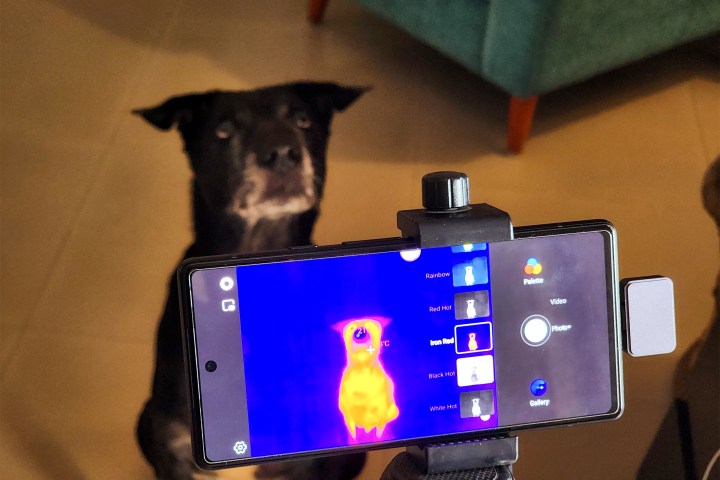
Besides humans, the camera is useful for our furry friends, too. For animals like dogs or cats, the preferred mode of taking body temperature is inside their ears or through rectums. So, taking their temperatures from a distance can be both comforting for the animals and also rid you of any uneasiness about using your thermometer to probe your friend’s tail end.
But it does not have to be all somber — you can use the camera for fun experiments, such as to see which parts of your pet’s body remain colder than the others or see if their body’s temperature changes after being offered a treat. If you don’t fancy playing Pavlov, you can be amazed by comparing how mammals, including humans, regulate the temperature of their noses.
Just look cooler

Another way to use the P2Pro thermal camera is to click selfies that depict the measure of your hotness or coolness. That is definitely an excellent way to stand apart on Instagram, grab your crush’s attention, or use it as an ice-breaker.
Be it with someone you adore or among friends, selfies with this thermal camera can be conversation starters. I can say with experience that passing the phone around and then comparing thermal camera selfies can definitely be a fantastic party game.
You can even record video with the camera irrespective of where you point it, making it a fun way to spend time.
A fresh perspective at a difficult price
Most of us love getting new toys as children; not much changes in that respect, even when we grow up. I think the InfiRay P2Pro has proven to be one such toy in my experience. It is a stimulating and unusual gadget with practical and fun uses, and I tend to gravitate towards the latter.
Despite its ability to expand your imagination, the P2Pro’s $299 price can feel like a bite into a fruit that you already know will turn out to be bitter. Ultimately, it may seem an avoidable purchase, especially when you consider you can find phones with inbuilt infrared or thermal cameras.
If you consider the options, there are two reasons the $299 purchase makes sense over buying a phone with a thermal camera. First, you can use the InfiRay camera with practically any phone instead of enduring the ordeal of setting up an entirely new phone. Second, the dedicated ASIC chip and the tuning features inside ensure better performance than those inexpensive phones. Adding to that, InfiRay is offering a 5% discount using “digitalgift5” as the discount code on Amazon.
Should you still buy this camera accessory? Only if you have $299 to spare for something that will be both fun to use and come in handy as a dependable tool for detecting faults and errors in things you can’t see or touch. It could even be a perfect gift for curious people, regardless of age.
Editors' Recommendations
- I did a OnePlus 12 vs. OnePlus 12R camera test, and there’s a big difference
- I think I took a photo of a ghost with my smartphone
- We now know when Apple is adding RCS to the iPhone
- I used a gaming smartphone for a week. Here’s how it surprised me
- My iPhone’s keyboard is driving me crazy

